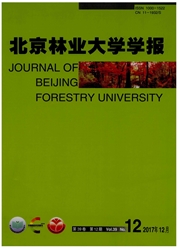

 中文摘要:
中文摘要:
近些年来,松材线虫入侵对三峡库区马尾松林造成严重危害,并严重威胁着三峡库区松林资源和三峡水利枢纽工程的生态安全。以不同的马尾松林生态系统(健康、感病1年、感病3年、感病5年、感病7年)为研究对象,采用样方法和每木调查法,分析松材线虫入侵早期马尾松林群落植物群落结构和土壤理化性质的动态变化。共调查了37种乔木物种,隶属于30科33属,其中马尾松是群落内的优势树种(IV=49.63%),樟树、槲栎、栓皮栎和檵木等树种的重要值也较高,为亚优势种;与健康林地相比,感病林地内马尾松的数量显著下降,平均胸径和平均树高呈现明显增加趋势;松材线虫入侵对群落内植物不同空间结构(乔木、灌木、草本)的物种多样性影响较大,且物种多样性指数随感病年限变化规律符合"中间高度膨胀理论";此外,不同感病年限马尾松林群落内土壤的化学性质变化不显著,但是与水分相关的物理性质变化显著。本研究明确阐明了松材线虫入侵早期,三峡库区典型马尾松林群落内植物群落结构、物种多样性指数和土壤理化性质的动态变化,旨在为改变三峡库区单一的马尾松林结构、增加群落的健康程度,从而为三峡水利枢纽工程的生态安全提供基础依据。
 英文摘要:
英文摘要:
In recent years, the invasion of the pine wood nematode (Bursaphelenchus xylophilus) has caused severe damage to Masson pines in the Three Gorges Reservoir Region, threatening pine forests in the region and ecological security in the Three Gorges water conservation project. Five sites of uniform Masson pine (Pinus massoniana) forests with various infection periods over time (non-infected, infected at two year intervals between 1 and 7 years) of pine wilt disease were selected for quadrat sampling and inspection of individual trees at each site. We investigated plant community structures and dynamic changes of physical and chemical properties in the soil of Masson pine stands. We recorded a total of 37 tree species ( DBH≥2.0 cm) in 30 families and 33 genera in 15 plots, where Masson pine was the dominant species with an importance value IV = 49.63% and broadleaved trees, such as camphor (Cinnamomum camphora), oriental white oak (Quercus aliena), cork oak (Q. variabilis) and China loropetal (Loropetalum chinense) as subdominant species. Compared with pine stands at non-infected sites, those at infected sites showed a sharp reduction in the number of trees, but with an obvious increase in their mean DBH and mean height. The invasion of pine wood nematode had a large impact on species diversity at various spatial structures of trees, shrubs and herbs. The pattern of variation in species diversity indices over the infection periods followed the theory of the " mid-altitude bulge". No significant differences were observed in chemical properties of the soil at the various infection sites. However, water-related physical properties in the soil were significantly different among the pine stands. This study revealed the plant community structures, indices of species diversity and dynamic changes of soil physical and chemical properties in the soil of Masson pine communities at the early stages of invasion by pine wilt nematodes in the region. This may provide basic evidence for the eco
 同期刊论文项目
同期刊论文项目
 同项目期刊论文
同项目期刊论文
 Quantitative Classification and Environmental Interpretation of Secondary Forests 18 Years After the
Quantitative Classification and Environmental Interpretation of Secondary Forests 18 Years After the Genetic Characterization of the Gypsy Moth from China (Lepidoptera, Lymantriidae) Using Inter Simple
Genetic Characterization of the Gypsy Moth from China (Lepidoptera, Lymantriidae) Using Inter Simple 期刊信息
期刊信息
